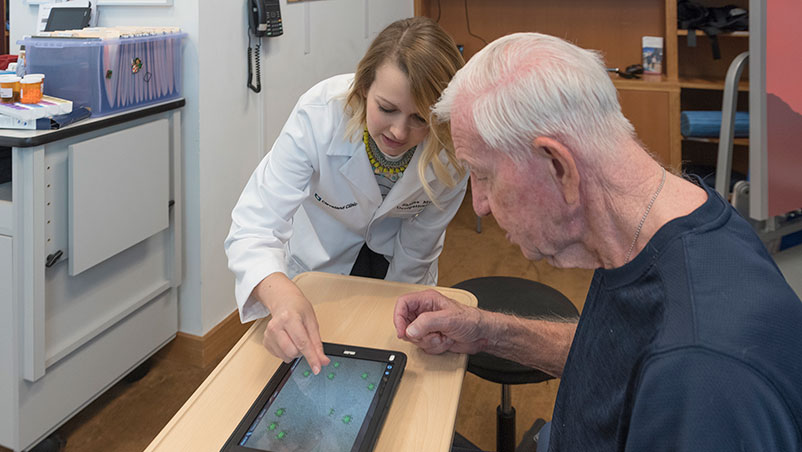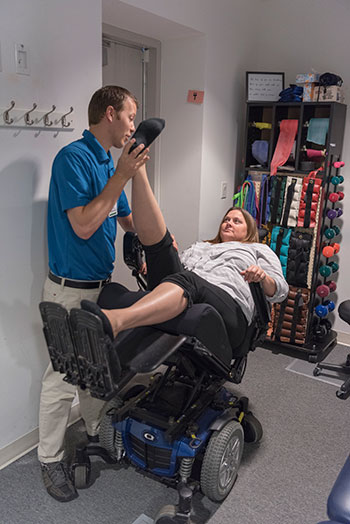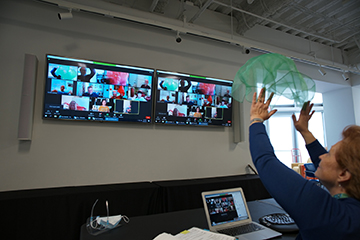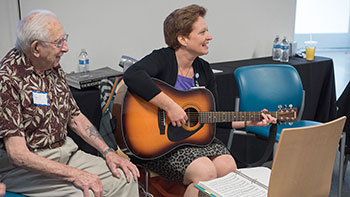Overview
At the Lou Ruvo Center for Brain Health in Las Vegas, our board certified specialists use cutting-edge technology and customized exercises during one-on-one individualized treatment sessions.
Our physical (PT), occupational therapy (OT) and speech-language pathology (SLP) programs are specifically tailored to the needs of those experiencing the effects of brain disorders. By incorporating patients’ interests and hobbies and offering socially enriching experiences, we work to increase our patients’ mobility and agility while decreasing fatigue and falls. We also work to improve all aspects of communication and cognition, as well as address swallowing challenges.
Our goal is to leverage research, provide expert care to patients and their caregivers, and empower patients to live as independently as possible.
Thanks to a grant from the E. L. Wiegand Foundation, the Lou Ruvo Center for Brain Health expanded its neurorehabilitation program by adding new equipment to both physical and occupational therapy programs.
Occupational Therapy

Occupational therapists work with patients and their caregivers to improve an individual’s ability to perform everyday activities with greater ease, satisfaction and independence through education and physical and/or cognitive interventions.
Occupational therapy at the Lou Ruvo Center for Brain Health is recommended when symptoms arising from cognitive issues, fatigue, or physical impairment make it difficult for an individual to perform:
- Activities of daily living: Bathing, dressing, grooming, driving, self-feeding and toileting
- Home management tasks: Preparing meals, cleaning or doing laundry, managing medication
- Work-related tasks: Typing, dialing or manipulation requiring fine motor skills
If you are experiencing decreased independence with self-care as a result of fatigue, memory or concentration impairments, or physical decline, ask your doctor how an occupational therapist might help.
Physical Therapy
Physical Therapy
1
of
3



People with brain disorders often limit activities and forget to move. Yet when we don’t use it, we lose it.
At the Lou Ruvo Center for Brain Health, physical therapists utilize a variety of treatment techniques, cutting-edge technology and evidence-based practices during individualized treatment sessions in order to optimize recovery and achieve the highest possible level of function. Interventions include:
- Aerobic conditioning
- Caregiver training
- Comprehensive balance testing and training
- Flexibility and strength training
- Individualized home exercise programs
- Partial body weight-supported treadmill training
- Functional mobility training
- Wheelchair assessments
We offer a comprehensive program featuring one-on-one PT for patients with degenerative brain diseases, including memory impairment, Parkinson’s disease and multiple sclerosis.
Speech Language Pathology
Speech-Language Pathology (SLP), commonly referred to as speech therapy, addresses communication limitations, (speech, language, voice) and swallowing disorders. At the Lou Ruvo Center for Brain Health, our approach to SLP is tailored to the needs of those with brain disorders.
Following a referral from a neurology provider, our board certified speech therapist works one-on-one with patients, evaluating each individual’s specific needs and selecting a combination of techniques that may include:
- Articulation improvement
- Aphasia/language therapy
- Cognitive retraining for memory and attention as well as organizing and planning
- Computer-aided speech or alternative non-vocal communication
- Swallowing therapy/modified barium swallowing exam
- Stuttering/fluency
- Voice improvement
- Patient and family education
Music Therapy
At Cleveland Clinic Nevada, our specialized music therapy program is tailored exclusively to those living with brain disorders involving cognitive decline. Facilitated by a board-certified and licensed music therapist, a clinical intervention can positively impact common challenges and symptoms, including:
- Motor skills
- Language and communication
- Memory and perception
- Emotion and expression
Watch how a shared love of music has helped a husband and wife navigate Alzheimer’s disease.
A Collaborative Approach
Music therapy can work collaboratively with physical, occupational and speech therapy to help you and your care partner maximize quality of life and increase enjoyment while living with a brain disorder.
Additionally, our music therapist can work with your Cleveland Clinic neurology care team to determine which music therapy approach is the best fit for your situation.
Individual or family sessions
You’ll receive an initial assessment, followed by therapy designed specifically for your needs and goals. Due to demand, these no-cost appointments require a referral from your Cleveland Clinic Nevada neurology provider.
Haven’t seen a Cleveland Clinic neurologist? Contact us to request a neurology appointment.
Group music therapy
Music therapy can be an ensemble pursuit, too. Conducted in a group setting, music therapy builds community and addresses specific group goals, such as movement or memory recall. Participants don’t need music experience to benefit from music therapy. Singing, listening, songwriting, instrument play and other techniques can be deployed to meet individual or group needs.
Group music therapy is available at no cost to those in the community living with dementia, regardless of where they receive neurological care. View the schedule here.

Music Stimulates Memory
 |
Music Therapist Becky Wellman, PhD, says memorization and recall of music can boost latent memories: “It’s common when hearing music to recall previous pleasurable encounters with the same tune. What most people never expect, however, is that music can actually help build new memories in individuals with cognitive disorders, and that during music therapy, participants are actually able to learn new songs when nothing else seems to stick.” |